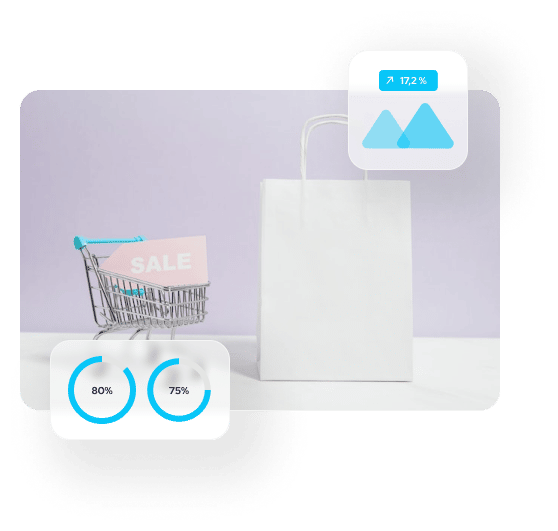Defining Digital Strategy and Roadmap
Through the structured approach of developing as-is and to-be states aligned with the business model and channel priorities.

Why do eCommerce Brands
Need a Strategy Roadmap?
eCommerce efforts are likely to fail without a clear roadmap with KPIs. These brands struggle to formulate the strategy as they lack a structured framework. The strategy development requires an in-depth understanding and cleansing of current data such as SKU performance per geography, most performing eCommerce customers, or regions. To succeed with eCommerce initiatives, the first step is to have a clearly defined strategy and roadmap.
Business Case Approval
Without a clear roadmap for the investment, brands struggle to get traction from their CFO and financial executives and get the project approved. So it’s critical to have a clear strategy of how the business will realize value through the eCommerce initiative.
Saving E-Commerce Platform Selection Disasters
Unclear strategy results in choosing the wrong platform, which might have performance issues or, worse, disruptions. The brands that invest in eCommerce strategy have a higher chance of being successful with their eCommerce platform implementation.
Targeting Issues
With unreliable data, these brands struggle with targeting the right geographies, SKUs, or channels. This might not only lead to the loss of the current investments, but it might also lead to losing current customers.
Succeed with ECommerce Initiatives
The clearer the objectives, the higher the chances of hitting them. Otherwise, it might be like aiming for a moving target. The brands that are successful with their eCommerce initiatives have an overall alignment of their goals (and execution).
Ease of Implementation and Integration
Sound strategy leads to smoother implementation and integration. Without a clear strategy, the implementation or integration may never work as per business expectations. Not to mention it is incredibly hard to get back on track once it goes live.
Customer Experience
The online experience relies on exceeding customers’ expectations with communication or product bundles. The more personal the experience, the happier the customers are likely to be. And brands that invest in strategy (and have clearly defined customer experience goals) are likely to have superior customer experience.
Want to learn more about why independent consultants have a higher success rate with eCommerce digital strategy roadmap?
Our Case Studies for
E-commerce Digital Strategy Roadmap

ECommerce Supply Chain Transformation With ERP Selection
Download the eCommerce Supply Chain transformation case study and learn how LockNLube transformed its inventory and supply chain challenges by consolidating over 20 systems. As well as by creating business, process, information, and system architecture as they prepare for the next phase of their growth.

Omnichannel eCommerce Customer Experience Transformation
Download the omnichannel eCommerce customer experience case study and learn how fashion retailer AKIRA built a digital roadmap and managed stakeholder expectations to transform its processes and systems to explore newer business models such as buy-online-pickup-in-store and curbside pickup.

ERP Optimization and Integration Architecture Development
Download the ERP optimization and integration architecture development case study and learn how Work Sharp fixed their broken ERP implementation that caused customer service issues and improved Supply Chain planning.
Our Methodology
for eCommerce Strategy Roadmap
The process starts with the assessment of your current processes (and data), followed by refinement of the target market and strategies. As well as digital assets and channels. It goes through several iterative phases until all stakeholders agree with the plan.

1 Assessment
Through primary and secondary research, this assessment digs into each of your datasets, transactions, and processes to develop the strategic roadmap.
3Targeting Strategy Roadmap
These are the tactical steps required to deliver on the goals identified in step 2. Based on the targeting strategies and revenue expectations, this step builds the roadmap for the operational capacity required. The operational capacity might be the inventory levels or transactional capacity of the systems.
5Strategy Finalization
Based on the results of the proof of concepts, the strategy goes through several iterations until the final strategy is ready for implementation.
2Target Market Roadmap
This is an iterative plan starting with an MVP. The MVP could include identifying a channel based on revenue goals that have the highest potential for revenue (and profit). It could also include identifying the right SKUs considering the constraints of the channel. As well as how to build on the success of the MVP.
4Proof of Concepts
This step goes through a series of proof of concepts to eliminate any financial or technical risks from the model. The proof of concept could be just the research for additional data or system testing, depending upon the risk identified.
Ready to learn how we can help With eCommerce Strategy Roadmap?
Our Other
eCommerce Services
ElevatIQ eCommerce services include digital strategy roadmap, channel analysis, product profitability analysis, customer journey mapping, UX and conversion issues, eCommerce platform optimization, system integration, eCommerce platform selection, re-platforming, and contract negotiations.
Digital Commerce Business Model Transformation
This service helps eCommerce brands enable business models such as D2C, buy-online-pickup in-store, buy-online-return-in-store, or subscription-based business models.
Headless Commerce Strategy and Architecture
This service helps eCommerce brands with headless architecture enablement, whether you need a custom headless solution or integration with monolithic platforms such as SAP Hybris and Salesforce Commerce Cloud. Or utilizing a newer breed of headless platforms such as commercetools, Spryker, or VTEX.
E-commerce Solution Architecture
This service helps in setting the right foundation for your architecture, whether your architecture might contain just one platform or several, including PIM, DAM, DXP, and CMS. ElevatIQ can help define the architecture you need to enable customer experience.

